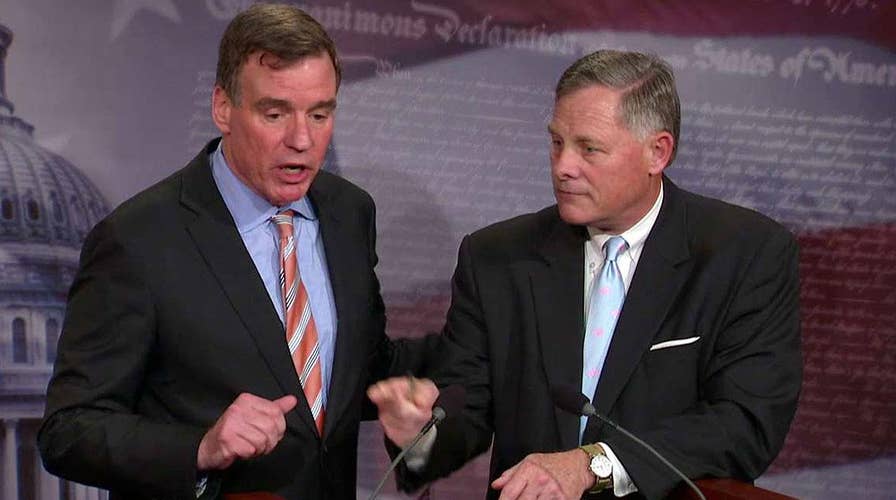Sen. Burr: I voted Trump, will take Russia probe seriously
Senate Intelligence Committee addresses question of impartiality
The Obama administration was “frozen” in combating 2016 Russian election meddling, according to a new report released Thursday by the Senate Intelligence Committee.
The panel released the third volume of its five-part report on the committee’s yearslong bipartisan investigation into Russian interference in the last presidential election.
“After discovering the existence, if not the full scope, of Russia’s election interference efforts in late 2016, the Obama Administration struggled to determine the appropriate response,” committee Chairman Richard Burr, R-N.C., said in a statement Thursday. “Frozen by ‘paralysis of analysis,’ hamstrung by constraints both real and perceived, Obama officials debated courses of action without truly taking one.”
Committee Ranking Member Mark Warner, D-Va., said he hoped the panel’s findings would “resonate with lawmakers, national security experts and the American public.”
“There were many flaws with the U.S. response to the 2016 attack, but it’s worth noting that many of those were due to problems with our own system — problems that can and should be corrected,” Warner said.
The report stated that the Obama administration was “not well-postured” to counter Russian election interference activity.
“While high-level warnings were delivered to Russian officials, those warnings may or may not have tempered Moscow’s activity, and Russia continued disseminating stolen emails, conducting social media-based influence operations, and working to access state voting infrastructure through Election Day 2016,” the committee found.
The committee also found that the Obama administration was “constrained in its response by a number of external and internal concerns,” including the “highly politicized” environment and concern that public warnings could undermine confidence in the election. They also found that the administration’s decision to limit and delay information sharing about the foreign influence threat was a factor to the constraint.
The committee added that the administration seemed to treat cyber and geopolitical aspects of the Russian campaign as “separate issues,” saying that this approach “may have prevented the administration from understanding the full extent of the threat Russia posed, limited its ability to respond.”
The committee laid out a series of recommendations for the government, including that the U.S. “exert its leadership” to create international cyber norms, which they said are currently being written by “hostile foreign actors.”
“U.S. leadership is necessary to establish any formalized international agreement on acceptable uses of cyber capabilities,” the committee said, also recommending that the executive branch fully prepare for future attacks on U.S. elections.
“Preparations should include the development of a range of standing options that can be rapidly executed in the event of a foreign influence campaign, as well as regular, apolitical threat assessments from the Director of National Intelligence,” the committee recommended.
They also urged the government to share “credible information” as “broadly as appropriate within the federal government, including Congress, while still protecting intelligence sources and methods.”
“Information should also be shared with relevant private sector partners and state and local authorities,” they continued. “In the event that an active measures campaign is detected, the public should be informed as soon as possible with a clear and succinct statement of the threat.”
Both Burr and Warner said that they were concerned by the administration’s concern with sharing information with the public for fear of creating alarm.
“I am particularly concerned, however, that a legitimate fear raised by the Obama Administration – that warning the public of the Russian attack could backfire politically – is still present in our hyper-partisan environment,” Warner said.
The second report released by the committee was made public last fall and urged President Trump to warn the public about efforts by foreign governments to interfere in U.S. elections and take steps to prevent hostile nations from using social media to meddle in the 2020 vote.
Meanwhile, for 2020, Burr said the U.S. is “in a better position to identify foreign interference efforts and address vulnerabilities Russia and other hostile foreign actors may seek to exploit.”
“We must continue building on the lessons of 2016, including making sure we have strong response options at the ready,” Burr said.
It is unclear when the committee will release the two final installments of the report, but they are expected to examine the 2017 Intelligence Community Assessment (ICA) on Russian interference and the committee’s final counterintelligence findings.
The committee's first report provided new details on how Russian government hackers directed extensive activity against U.S. election infrastructure, and faulted the FBI and Department of Homeland Security for providing inadequate warnings to state governments,
The committee's investigation into Russian meddling went on for more than two years, with senators on the panel having the chance to interview more than 200 people.
"We have no factual evidence of collusion between the Trump campaign and Russia," Burr said last year.
Former Special Counsel Robert Mueller last year also concluded his yearslong investigation into whether Trump campaign associates colluded with the Russian government to influence the 2016 election. Mueller found no evidence of criminal coordination or conspiracy.






















